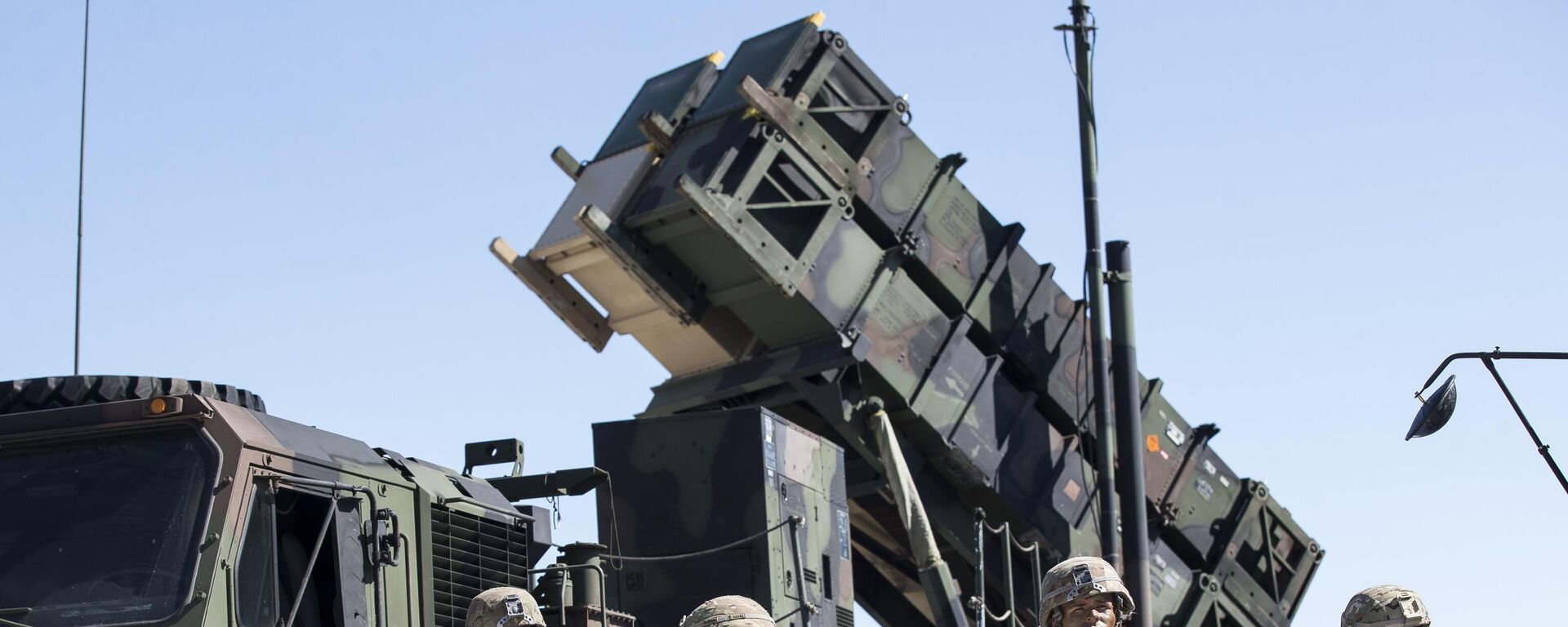https://sputnikglobe.com/20240418/european-sky-shield-initiative-what-is-it-and-who-might-benefit-from-it-1117994218.html
European Sky Shield Initiative: What is It and Who Might Benefit From It?
European Sky Shield Initiative: What is It and Who Might Benefit From It?
Sputnik International
In August 2022, not long after the escalation of the Ukrainian conflict, Germany launched a pan-European project ostensibly aimed at creating a coordinated air defense in Europe.
2024-04-18T13:24+0000
2024-04-18T13:24+0000
2024-04-18T13:24+0000
military
europe
air defense
iron dome
https://cdn1.img.sputnikglobe.com/img/07e8/03/0d/1117296767_0:89:3326:1960_1920x0_80_0_0_e9bbb75504187ef1ba2ae3e59eef394e.jpg
Some 18 other states signed on to this German plan, which was dubbed the European Sky Shield Initiative (or ESSI for short): Britain, Norway, Sweden, Denmark, Czech Republic, Slovakia, Bulgaria, Slovenia, Belgium, Romania, the Netherlands, Hungary, Austria, Switzerland, Finland and the Baltic States (Estonia, Latvia and Lithuania).Two other countries, Turkiye and Greece, are also expected to join the ESSI this year, and Polish Prime Minister Donald Tusk announced his week that Poland intends to sign on to the initiative as well.While this scheme has already been compared by some to Israel’s Iron Dome system, former officer of Swedish Armed Forces and Sweden Democrats party’s ex-chief of staff Mikael Valtersson argues that such comparison would be inaccurate.“By doing this, interoperability and common maintenance will also be ensured. Sky Shields’ goals, are not presently, to create a common AD-system for the participating countries, but it will make such a system easier to achieve with few interoperable missile systems in the ESSI member countries,” he elaborated.Valtersson also points out that a number of prominent European states, such as France, Italy and Spain, are not participating in the ESSI.According to him, creating an Iron Dome analogue in Europe under the ESSI auspices would be problematic, seeing how “the participating countries are spread out all over Europe,” which would “make the common AD of their territories nearly impossible.”Currently, it appears that Germany might be the main beneficiary of the ESSI, Valtersson suggests.“One clear sign that Sky Shield mainly is aimed at reducing German procurement costs, by acquisition cooperation, is the fact that the only included missile systems are systems that Germany plans to have in the future, namely medium range IRIS-T SLM, long range MIM-104 Patriot and the very long range Israeli Arrow 3,” he remarks. “In contrast, the French-Italian SAMP-T missile system isn't included in Sky Shield, which is the reason that France and Italy aren't members of the ESSI.”
https://sputnikglobe.com/20240331/germany-to-produce-1st-patriot-air-defense-missiles-within-3-years--1117672681.html
Sputnik International
feedback@sputniknews.com
+74956456601
MIA „Rossiya Segodnya“
2024
Sputnik International
feedback@sputniknews.com
+74956456601
MIA „Rossiya Segodnya“
News
en_EN
Sputnik International
feedback@sputniknews.com
+74956456601
MIA „Rossiya Segodnya“
Sputnik International
feedback@sputniknews.com
+74956456601
MIA „Rossiya Segodnya“
european sky shield initiative, europe air defense, european air defense systems
european sky shield initiative, europe air defense, european air defense systems
European Sky Shield Initiative: What is It and Who Might Benefit From It?
In August 2022, not long after the escalation of the Ukrainian conflict, Germany launched a pan-European project ostensibly aimed at creating a coordinated air defense in Europe.
Some 18 other states signed on to this German plan, which was dubbed the
European Sky Shield Initiative (or ESSI for short): Britain, Norway, Sweden, Denmark, Czech Republic, Slovakia, Bulgaria, Slovenia, Belgium, Romania, the Netherlands, Hungary, Austria, Switzerland, Finland and the Baltic States (Estonia, Latvia and Lithuania).
Two other countries, Turkiye and Greece, are also expected to join the ESSI this year, and Polish Prime Minister Donald Tusk announced his week that Poland intends to sign on to the initiative as well.
While this scheme has already been compared by some to Israel’s Iron Dome system, former officer of Swedish Armed Forces and Sweden Democrats party’s ex-chief of staff Mikael Valtersson argues that such comparison would be inaccurate.
“The Iron Dome is a fully integrated AD (air defense) system aimed at protecting Israel with several layers of AD assets. The Sky Shield is more of a coordinated procurement system aimed at maximizing cost-effectiveness by coordinated acquisition of different AD systems,” he explains.
“By doing this, interoperability and common maintenance will also be ensured. Sky Shields’ goals, are not presently, to create a common AD-system for the participating countries, but it will make such a system easier to achieve with few interoperable missile systems in the ESSI member countries,” he elaborated.
Valtersson also points out that a number of prominent European states, such as France, Italy and Spain, are not participating in the ESSI.
According to him, creating an
Iron Dome analogue in Europe under the ESSI auspices would be problematic, seeing how “the participating countries are spread out all over Europe,” which would “make the common AD of their territories nearly impossible.”
“Another fact that shows that the ESSI isn't a common missile shield is the fact that neutral Switzerland and Austria are participating in the ESSI. A common missile shield would go against both countries neutrality," Valterson adds. “We also have the fact that both Greece and Türkiye have Russian missile systems, Greece has older S-300 missiles and Türkiye new S-400 missiles. Especially Türkiye's S-400 has been deemed inoperable with western AD systems for security reasons.”
Currently, it appears that Germany might be the main beneficiary of the ESSI, Valtersson suggests.
“One clear sign that Sky Shield mainly is aimed at reducing German procurement costs, by acquisition cooperation, is the fact that the only included missile systems are systems that Germany plans to have in the future, namely medium range IRIS-T SLM, long range MIM-104 Patriot and the very long range Israeli Arrow 3,” he remarks. “In contrast, the French-Italian SAMP-T missile system isn't included in Sky Shield, which is the reason that France and Italy aren't members of the ESSI.”



